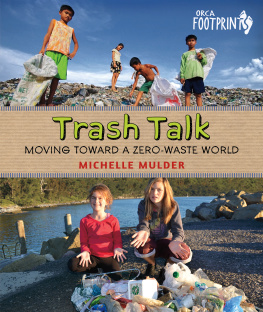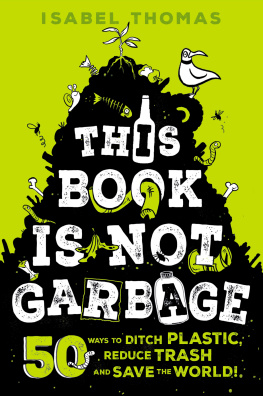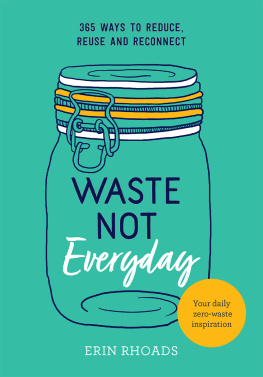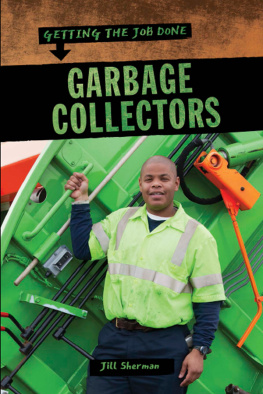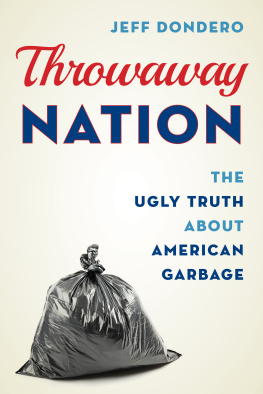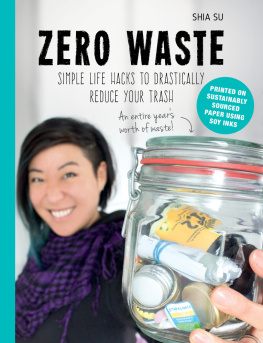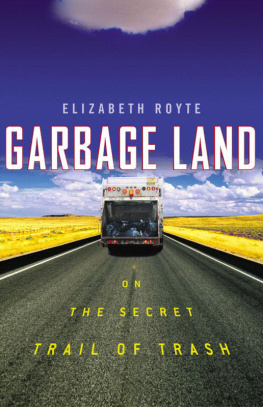Copyright 2012 by Amy Korst
All rights reserved.
Published in the United States by Ten Speed Press, an imprint of the Crown Publishing Group, a division of Random House, Inc., New York.
www.crownpublishing.com
www.tenspeed.com
Ten Speed Press and the Ten Speed Press colophon are registered trademarks of Random House, Inc.
Library of Congress Cataloging-in-Publication Data
Korst, Amy, 1984
The zero-waste lifestyle : live well by throwing away less / Amy Korst. First edition.
pages cm
1. Sustainable living. 2. Green movement. 3. Consumer education. I. Title.
GE196.K67 2012
640.286dc23
2012027296
ISBN 978-1-60774-348-4
eISBN: 978-1-60774-349-1
Design by Chloe Rawlins
v3.1
To my husband, Adam, for walking alongside me on the beach, in the mountains, and through this journey we call life.
Acknowledgments
Truly, it takes a village to raise a book from infancy to the grown-up product youre holding today. Id like to thank my personal village for believing in this project, including:
My agent, Jeff Kleinmanwho saw potential in this book and who helped my writing more than anyone ever hasas well as the entire team at Folio Literary Agency.
My editor, Julie Bennett, for taking a chance on a project about trash, and all the talented folks at Ten Speed Press, including the hard-working publicity and marketing team: Patricia Kelly, Michele Crim, Kara Van de Water, and Ashley Matuszak. Your work to spread the zero-waste message never ceases to amaze me; I appreciate you.
The Salem-Keizer Master Recycler Program, for teaching me the ins and outs of recycling.
Zero-waste contributors and their familiesApril Luebbert, Rose Brown, Chris Burger, Joe Barnes, Desira Fuqua, and Robert Haleyfor opening up your lives to me and dealing with lots of phone calls, emails, and paperwork.
My readers at www.greengarbageproject.com and my Facebook fans, for a network of support.
The Korst, Bowden, and Fiala families, for wrapping our Christmas gifts in, variously, towels, fabric, newspaper, aviation maps, comic strips, and baskets, just so you didnt add to our garbage tally.
Taylor and Hunter, for spending a week with Aunt Amy and Uncle Adam and dealing with us while we were still getting this whole zero-waste thing figured out.
Mom and Dad, for telling me I can do anything.
Steve and Carol, Joey and Ashley, for support and laughter.
And finally, my husband, Adam, without whom none of this would have happened.
Foreword
Once a year I volunteer to run the biweekly trash and recycling day in our small Vermont town. For three hours on Saturday morning, people show up in station wagons and pickups, all groaning with sacks of garbage, and with cans, bottles, papers, all carefully separated out. My main thought, every time, is: how does this tiny town (500 people) manage to generate quite so much trash? Because, man, theres a lotlast time, by the end of the three hours, I was stomping the recycling bin like a vintner in the grape vat, just trying to make room for the last few carloads.
Im, of course, as guilty as most. I may not generate as much trash as some Americans, but compared to parts of the poor world where Ive spent lots of time, Im a wastrel of the first order. And compared to Amy Korst, author of this bookwell, theres no comparison. Shes pared down her waste to the vanishing point, which is an admirable act, and shes willing to share her secrets, which is even more admirable. Theres no way to read this book without absorbing lots of good ideas about how you might change your life.
If you follow this advice, youll be helping the planet. But Id be remiss if I didnt add that we also need you to do more. The fight against scourges like climate change must be fought on the local front, as Korst advises, and also nationally and internationally, by building the movements that can change some of the structures that lead to waste and carelessness. In the end, we need Exxon and Chevron to be zero waste too.
This book is a great gift. Dont feel guilty reading it, and dont obsess about the truly tiny things (the foil cap under the plastic lid on the ketchup bottle); feel grateful for all the good advice, and take as much of it as you possibly can!
Bill McKibben
Introduction:
Trash, Trash, Everywhere
Everybody has a trash can. In fact, its a safe bet that we all have multiple trash cans crowding our livesin the bathroom, in the car, under the kitchen sink, and in the garage.
Before I started living trash free with my husband, Adam, we had all of the above in our house, for a total of five trash cans at our instant disposal. One day, while out running errands I counted how many trash cans I came in contact with in public restrooms, restaurants, movie theaters, and stores: thirty-two! I couldnt believe it. Then I heard a statistic that still troubles me: the average American produces three pounds of landfill-bound garbage each day. I started seeing trash everywhere, especially in places it doesnt belong, like littering the sides of the road and all over the wilderness where we went hiking and camping. I watched the trash pile up in our five garbage cans, and I hauled a full 32-gallon can to the curb each week. We tried hard to be green, so I didnt understand how we could be responsible for creating so much trash. Where did it all come from?
I decided to take a closer look at our countrys trash habits, and the more I dug, the dirtier things appeared to be. Although these piles of trash we each produce every year are stinky and unsightly, the problem is much worse than thatfor our environment and our health. Trash is intimately connected to every environmental problem we face today, from climate change and habitat destruction to water pollution and chemical exposure. Its also intensely personal and impacts every decision in our daily lives, including everything from how much money we spend to how much weight we gain.
Facing My Trash Addiction
When I first faced these facts, I couldnt believe how something as innocuous as our garbage could be negatively connected to so many of my personal and political concerns, but the facts were undeniableif I wanted to change the countrys trash addiction, I had to address my own trash problem first. But how?
I had heard about people in other parts of the world living trash free, which basically means sending nothing to the landfillever. I wondered if the same could be done here in the United States, in a country where people produce more trash than anywhere else in the world.
One night, after scraping dinner leftovers into the trash can, something inside me snapped. I had spent all week agonizing over every item I threw away, from tiny metal paper clips to empty deodorant containers.
Tentatively I broached the subject with Adam.
Remember last weekend when my parents were here?
Yeah. He was looking at his computer, distracted.
We were joking about living trash free for a whole year? I think I want to do it.
This got his attention. He looked at me, eyebrows raised. He studied my face to see whether I was serious. I was afraid I had gone too far around the environmental bend even for my liberal husband.
Okay, he said. And he went back to work.
Okay? Thats the whole conversation? Just okay?
He turned back to me. Look, Ive been thinking about it all week, too. It feels like its time we do something big for the environment, put our money where our mouths are. If you want to do it, Im on board.


